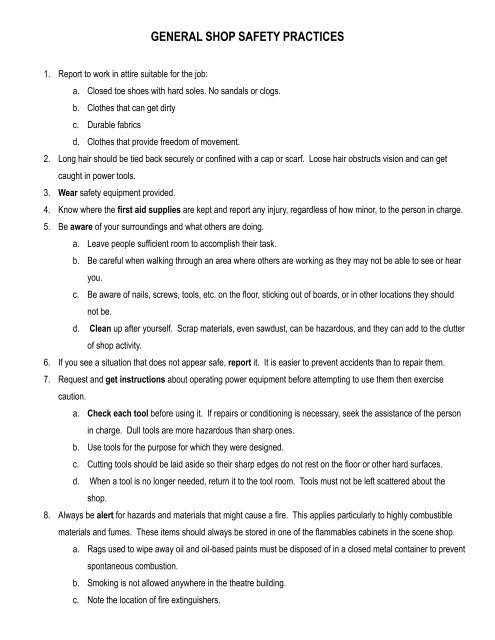Create successful ePaper yourself
Turn your PDF publications into a flip-book with our unique Google optimized e-Paper software.
GENERAL SHOP SAFETY PRACTICES<br />
1. Report to work in attire suitable for the job:<br />
a. Closed toe shoes with hard soles. No sandals or clogs.<br />
b. Clothes that can get dirty<br />
c. Durable fabrics<br />
d. Clothes that provide freedom of movement.<br />
2. Long hair should be tied back securely or confined with a cap or scarf. Loose hair obstructs vision and can get<br />
caught in power tools.<br />
3. Wear safety equipment provided.<br />
4. Know where the first aid supplies are kept and report any injury, regardless of how minor, to the person in charge.<br />
5. Be aware of your surroundings and what others are doing.<br />
a. Leave people sufficient room to accomplish their task.<br />
b. Be careful when walking through an area where others are working as they may not be able to see or hear<br />
you.<br />
c. Be aware of nails, screws, tools, etc. on the floor, sticking out of boards, or in other locations they should<br />
not be.<br />
d. Clean up after yourself. Scrap materials, even sawdust, can be hazardous, and they can add to the clutter<br />
of shop activity.<br />
6. If you see a situation that does not appear safe, report it. It is easier to prevent accidents than to repair them.<br />
7. Request and get instructions about operating power equipment before attempting to use them then exercise<br />
caution.<br />
a. Check each tool before using it. If repairs or conditioning is necessary, seek the assistance of the person<br />
in charge. Dull tools are more hazardous than sharp ones.<br />
b. Use tools for the purpose for which they were designed.<br />
c. Cutting tools should be laid aside so their sharp edges do not rest on the floor or other hard surfaces.<br />
d. When a tool is no longer needed, return it to the tool room. Tools must not be left scattered about the<br />
shop.<br />
8. Always be alert for hazards and materials that might cause a fire. This applies particularly to highly combustible<br />
materials and fumes. These items should always be stored in one of the flammables cabinets in the scene shop.<br />
a. Rags used to wipe away oil and oil-based paints must be disposed of in a closed metal container to prevent<br />
spontaneous combustion.<br />
b. Smoking is not allowed anywhere in the theatre building.<br />
c. Note the location of fire extinguishers.






![2023-2024 BSC Catalog Updated_UG ONLY_FINAL[82]](https://img.yumpu.com/68414854/1/178x260/2023-2024-bsc-catalog-updated-ug-only-final82.jpg?quality=85)









